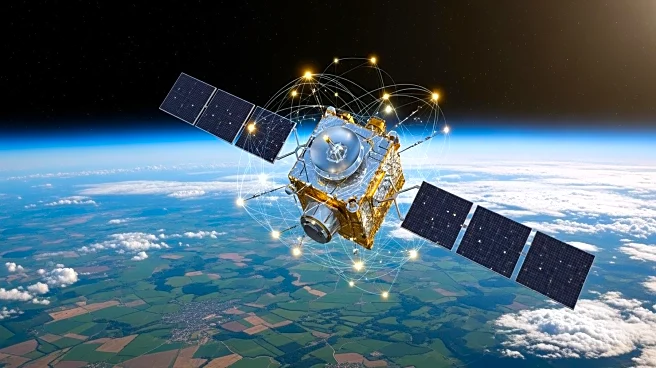What's Happening?
A high-level delegation from Punjab, led by Minister for Agriculture and Livestock Syed Ashiq Hussain Kirmani, visited Beijing to discuss the integration of advanced satellite technology into Pakistan's
agriculture sector. The delegation met with Piesat, a Chinese satellite company, to explore potential cooperation in satellite-based crop monitoring, disaster management, and digital watershed systems. These technologies aim to enhance farming efficiency and sustainability in Punjab, Pakistan's agricultural heartland. The provincial government has launched a Rs30 billion high-tech mechanization program to promote precision agriculture and reduce post-harvest losses. The meeting is part of ongoing Pakistan-China collaboration, with previous agreements including a smart agriculture pilot project and a $400 million deal to develop an independent satellite network.
Why It's Important?
The collaboration between Punjab and Piesat represents a significant step towards modernizing Pakistan's agriculture sector, which is crucial for the country's economy and food security. By adopting satellite technology, Punjab aims to improve resource management, detect crop stress early, and enhance resilience to climate shocks. This initiative could lead to increased agricultural productivity and sustainability, benefiting farmers and the broader economy. The partnership also strengthens Pakistan-China relations, showcasing a shared vision for leveraging space technology to address agricultural challenges. The move could set a precedent for other regions in Pakistan to adopt similar technologies, potentially transforming the country's agricultural landscape.
What's Next?
The Punjab delegation's visit to Beijing is expected to lead to further cooperation agreements with Piesat, focusing on the implementation of satellite-based technologies in agriculture. The success of these initiatives could encourage other provinces in Pakistan to explore similar partnerships, potentially leading to nationwide agricultural modernization. Stakeholders, including government officials and farmers, will likely monitor the outcomes of these projects closely. The collaboration may also prompt discussions on expanding the use of satellite technology to other sectors, such as communications and weather forecasting, further enhancing Pakistan's technological capabilities.
Beyond the Headlines
The integration of satellite technology into agriculture raises important ethical and legal considerations, such as data privacy and the equitable distribution of technological benefits. Ensuring that small-scale farmers have access to these advancements will be crucial to avoid widening the gap between large and small agricultural enterprises. Additionally, the collaboration highlights the growing influence of China in Pakistan's technological development, which may have geopolitical implications. As Pakistan continues to strengthen ties with China, it may face pressure from other international partners to balance its foreign relations.









